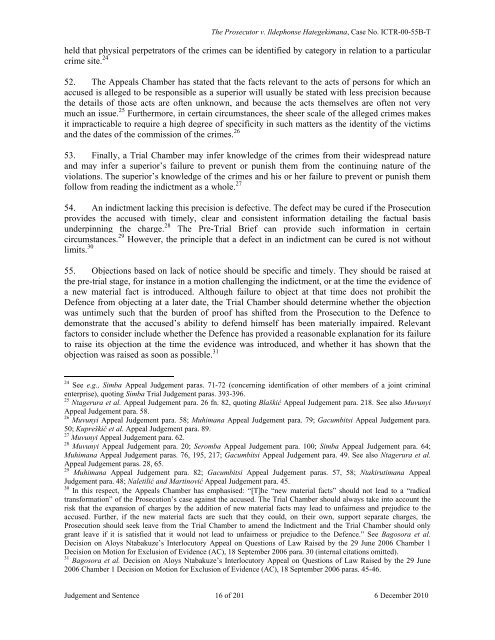Hategekimana - JUDGEMENT & SENTENCE - Refworld
Hategekimana - JUDGEMENT & SENTENCE - Refworld
Hategekimana - JUDGEMENT & SENTENCE - Refworld
You also want an ePaper? Increase the reach of your titles
YUMPU automatically turns print PDFs into web optimized ePapers that Google loves.
The Prosecutor v. Ildephonse <strong>Hategekimana</strong>, Case No. ICTR-00-55B-T<br />
held that physical perpetrators of the crimes can be identified by category in relation to a particular<br />
crime site. 24<br />
52. The Appeals Chamber has stated that the facts relevant to the acts of persons for which an<br />
accused is alleged to be responsible as a superior will usually be stated with less precision because<br />
the details of those acts are often unknown, and because the acts themselves are often not very<br />
much an issue. 25 Furthermore, in certain circumstances, the sheer scale of the alleged crimes makes<br />
it impracticable to require a high degree of specificity in such matters as the identity of the victims<br />
and the dates of the commission of the crimes. 26<br />
53. Finally, a Trial Chamber may infer knowledge of the crimes from their widespread nature<br />
and may infer a superior’s failure to prevent or punish them from the continuing nature of the<br />
violations. The superior’s knowledge of the crimes and his or her failure to prevent or punish them<br />
follow from reading the indictment as a whole. 27<br />
54. An indictment lacking this precision is defective. The defect may be cured if the Prosecution<br />
provides the accused with timely, clear and consistent information detailing the factual basis<br />
underpinning the charge. 28 The Pre-Trial Brief can provide such information in certain<br />
circumstances. 29 However, the principle that a defect in an indictment can be cured is not without<br />
limits. 30<br />
55. Objections based on lack of notice should be specific and timely. They should be raised at<br />
the pre-trial stage, for instance in a motion challenging the indictment, or at the time the evidence of<br />
a new material fact is introduced. Although failure to object at that time does not prohibit the<br />
Defence from objecting at a later date, the Trial Chamber should determine whether the objection<br />
was untimely such that the burden of proof has shifted from the Prosecution to the Defence to<br />
demonstrate that the accused’s ability to defend himself has been materially impaired. Relevant<br />
factors to consider include whether the Defence has provided a reasonable explanation for its failure<br />
to raise its objection at the time the evidence was introduced, and whether it has shown that the<br />
objection was raised as soon as possible. 31<br />
24 See e.g., Simba Appeal Judgement paras. 71-72 (concerning identification of other members of a joint criminal<br />
enterprise), quoting Simba Trial Judgement paras. 393-396.<br />
25 Ntagerura et al. Appeal Judgement para. 26 fn. 82, quoting Blaškić Appeal Judgement para. 218. See also Muvunyi<br />
Appeal Judgement para. 58.<br />
26 Muvunyi Appeal Judgement para. 58; Muhimana Appeal Judgement para. 79; Gacumbitsi Appeal Judgement para.<br />
50; Kupreškić et al. Appeal Judgement para. 89.<br />
27 Muvunyi Appeal Judgement para. 62.<br />
28 Muvunyi Appeal Judgement para. 20; Seromba Appeal Judgement para. 100; Simba Appeal Judgement para. 64;<br />
Muhimana Appeal Judgement paras. 76, 195, 217; Gacumbitsi Appeal Judgement para. 49. See also Ntagerura et al.<br />
Appeal Judgement paras. 28, 65.<br />
29 Muhimana Appeal Judgement para. 82; Gacumbitsi Appeal Judgement paras. 57, 58; Ntakirutimana Appeal<br />
Judgement para. 48; Naletilić and Martinović Appeal Judgement para. 45.<br />
30 In this respect, the Appeals Chamber has emphasised: “[T]he “new material facts” should not lead to a “radical<br />
transformation” of the Prosecution’s case against the accused. The Trial Chamber should always take into account the<br />
risk that the expansion of charges by the addition of new material facts may lead to unfairness and prejudice to the<br />
accused. Further, if the new material facts are such that they could, on their own, support separate charges, the<br />
Prosecution should seek leave from the Trial Chamber to amend the Indictment and the Trial Chamber should only<br />
grant leave if it is satisfied that it would not lead to unfairness or prejudice to the Defence.” See Bagosora et al.<br />
Decision on Aloys Ntabakuze’s Interlocutory Appeal on Questions of Law Raised by the 29 June 2006 Chamber 1<br />
Decision on Motion for Exclusion of Evidence (AC), 18 September 2006 para. 30 (internal citations omitted).<br />
31 Bagosora et al. Decision on Aloys Ntabakuze’s Interlocutory Appeal on Questions of Law Raised by the 29 June<br />
2006 Chamber 1 Decision on Motion for Exclusion of Evidence (AC), 18 September 2006 paras. 45-46.<br />
Judgement and Sentence 16 of 201 6 December 2010

















